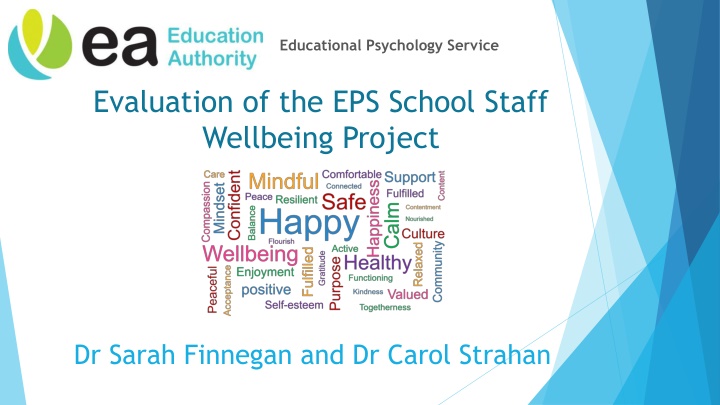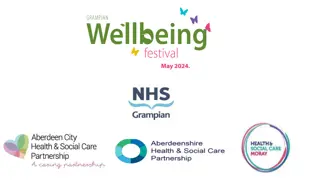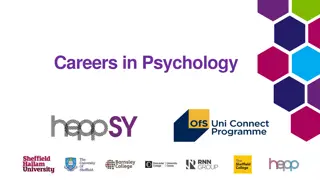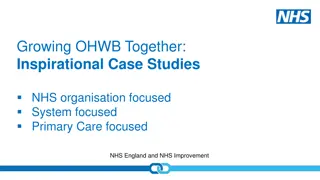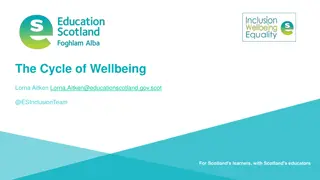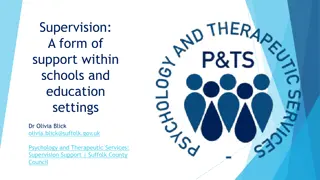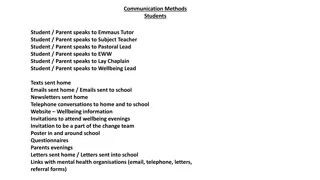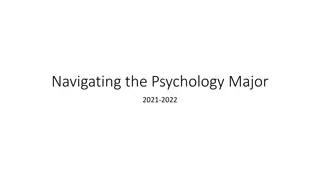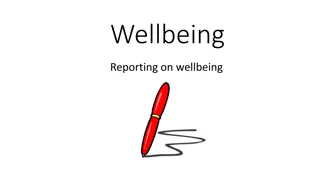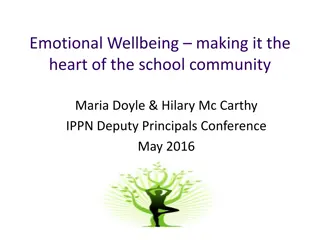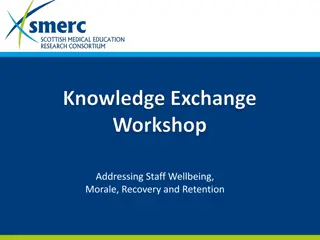Promoting Staff Wellbeing in Educational Psychology Services: A Comprehensive Approach
This project aims to address the increasing levels of work-related stress and mental health issues among school staff in Northern Ireland. By identifying a Health and Wellbeing Lead, providing evidence-based training, developing a staff wellbeing policy, and creating a peer support network, the project seeks to promote emotional health and wellbeing in school communities. The ultimate goal is to establish a culture that prioritizes staff wellbeing and supports a positive work environment.
Download Presentation

Please find below an Image/Link to download the presentation.
The content on the website is provided AS IS for your information and personal use only. It may not be sold, licensed, or shared on other websites without obtaining consent from the author.If you encounter any issues during the download, it is possible that the publisher has removed the file from their server.
You are allowed to download the files provided on this website for personal or commercial use, subject to the condition that they are used lawfully. All files are the property of their respective owners.
The content on the website is provided AS IS for your information and personal use only. It may not be sold, licensed, or shared on other websites without obtaining consent from the author.
E N D
Presentation Transcript
Educational Psychology Service Evaluation of the EPS School Staff Wellbeing Project Dr Sarah Finnegan and Dr Carol Strahan
Can you share an example of good support that you received from a manager? How did this support your wellbeing?
Rationale In the UK 70 million workdays are lost each year due to workplace mental health issues, costing employers approximately 2.4 billion per year (Together for You, 2018) In Northern Ireland, mental health issues are the leading cause of workplace absence, accounting for 31.9% of working days lost and 39.1% of long-term sickness leave (Action Mental Health, 2018) Northern Ireland has the highest prevalence of mental health issues in the UK, with a 25% higher overall prevalence of mental health problems than England A report from Education Support (2019) suggests that work-related stress appears to be rising teachers reported increasing levels of stress over 3 consecutive years 34% of teachers reported experiencing a mental health issue in previous year, 84% of SMT reported high levels of stress, and more than half (57%) of educational professionals claimed they had considered leaving their jobs in the last two years due to health and wellbeing pressures
Project Aims To identify a Health and Wellbeing Lead To promote the emotional health & wellbeing of school communities by effectively supporting staff in creating a culture that emphasises the importance of staff wellbeing To provide effective evidence-based training focusing on staff wellbeing To support school staff in developing a comprehensive yet user- friendly staff wellbeing policy as a component of the school development plan To develop a peer support network for staff wellbeing facilitated through the termly cluster groups across NI
Webinar 1: School Culture An Environment of: Trust Safety Vulnerability Build a sense of collective efficacy: Clear communication Collaboration- Learning Psychological Wellbeing
Webinar 2: Teacher Stress Within The School Environment Teacher stress and stressors on staff The impact of Covid-19 on teachers stress Staff burnout and how to identify the signs The Bioecological Model Bronfenbrenner (1994) What protective factors are in place in schools and what could be better? -discussion Managing stress / anxiety and self-care
Webinar 3: Policy and Peer Supervision Whole School Approach to Mental Health & Wellbeing Role of Wellbeing Lead Whole School Approach to Wellbeing School Development Plan and Policy Introduction to Peer Supervision
Webinar 4: Toolkit for Wellbeing PERSONAL GROWTH: Reward and recognition, supervision, self-care, CPD RELATIONSHIPS: Effective leadership, collegiality, communication BASIC NEEDS: Environmental adaptations, workload, work-life balance
Impact evaluation The Kirkpatrick Model (1976) Level 1: REACTION -The degree to which learners have found the training to be relevant to the role, engaging and useful. Level 2: LEARNING - The degree to whether the learner has acquired the knowledge, skills, attitude, confidence, and commitment that the program has focused on. Level 3: BEHAVIOUR - The degree to whether behavioural changes have occurred after learning- if the learners are taking what they learned in training and applying it as they do their job. Level 4: RESULTS - The impact the training has had on the broader organisational goals and objectives
Thematic Analysis Learning Training Format Confidence/ Motivation Thematic Analysis Transfer of Learning Support
Conclusions and Limitations The evaluation of the training indicates that participants increased: otheir knowledge and confidence in supporting staff wellbeing and developing a staff wellbeing policy. o more confident in talking to SMT about staff wellbeing and implementing practical strategies to support staff wellbeing in their setting. o participants felt supported and encouraged throughout the training. It is anticipated that this support will continue through the facilitation of cluster groups Time Constraint
Next Steps Training will be delivered to more schools and nurseries in 2023 Elements of the training should be expanded and developed in response to participant feedback and cluster group suggestions e.g. focusing more on peer supervision models Appreciative Inquiry in September 2022 Cluster groups will continue to run
Loughshore Education Resource Centre Wellbeing Tree
EPS session 4: General Wellbeing Strategies It must be emphasized that wellbeing is the right but also the responsibility of every singlemember of staff; no one person should bear the burden. 1. Identify a Health and Wellbeing Lead collaborating with all staff, SMT, and external Agencies e.g., Women s Aid, Inspire, Light House, Mind, E.A , Carafriend, E.A Wellhub, Restorative Practice, University of Ulster Relational Learning Initiatives. 2. Enshrine staff wellbeing in policy draft policy to be ratified. 3. Promote openness Anonymous staff surveys / findings were shared, and action plans based on these. 4. Offer supervision Post Serious Incident Buddy System (4 respected staff members) 5. Consider communication Email only during office hours, ongoing staff consultations e.g. Nurture Analysis for a Nurture Action Plan. Termly Student Voice
EPS session 4: General Wellbeing Strategies 6. Foster relationships Ongoing Wellbeing Wednesdays and now occasional Fat Fridays (serving cooked Breakfasts for staff by staff) We have completed University of Ulster Taking Boys Seriously Relational Learning Programme (see final slide). 7. Raise awareness Online shared staff/student newsletter promoting Wellbeing, Wellbeing Noticeboards. 8. Reconfigure workload ongoing shared ideas using a Wellbeing and Nurture based approach. 9. Appraise and appreciate Ongoing celebration and collaboration, Restorative Practice culture 10. Adapt the environment We are developing a Nurture, restorative practices and Wellbeing Based School culture.
